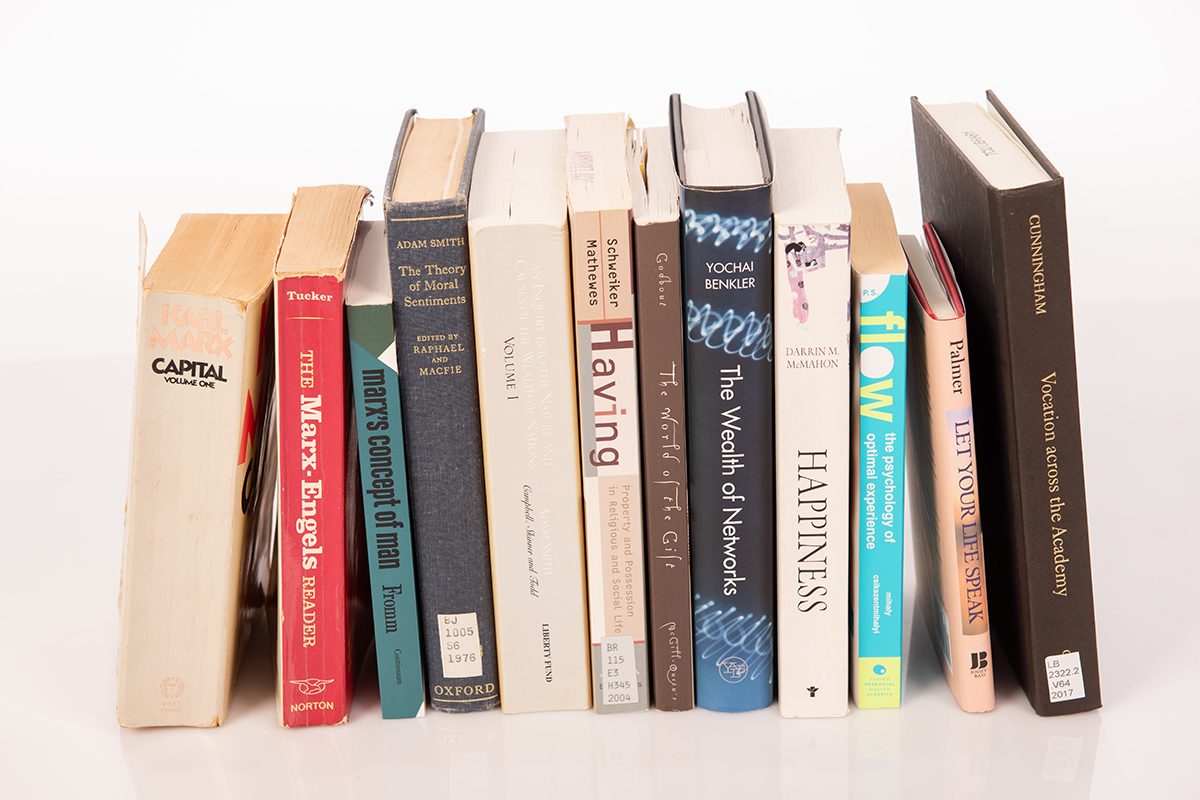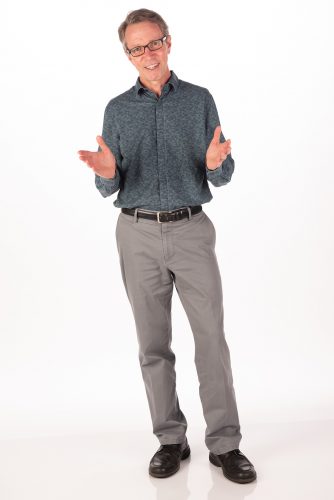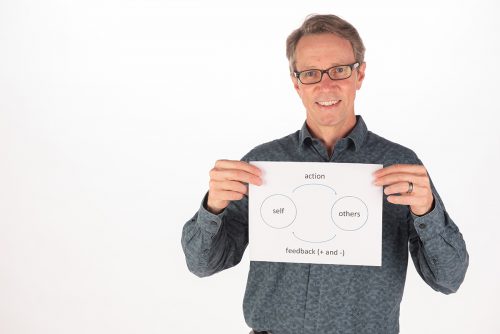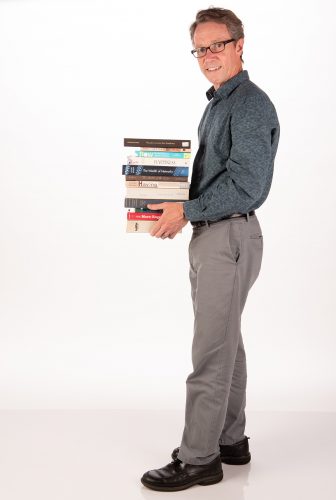
Photo by Glen E. Ellman
Factoring Humanity and Happiness into Economic Calculations
In a Q&A, Rob Garnett, professor of economics, honors professor of social sciences and associate dean in the John V. Roach Honors College, combines economics with happiness.
Rob Garnett challenges the standard approach to economics. His courses on callings and happiness put economics in dialogue with philosophy, sociology, psychology, anthropology and religion. He works to craft a greater picture of what it means to be a human in an interdependent world.
What is economics, and why is studying it important?

Rob Garnett, professor of economics, honors professor of social sciences and associate dean in the John V. Roach Honors College, discusses the responsibility of economics. Photo by Glen E. Ellman
Economics helps us understand ourselves, other people, the depths of our connections to others and the social forces that shape people’s opportunities and well-being. At its core, economics is about how we invest our personal resources — including our time, attention, empathy and care — in pursuit of whatever we value and, in turn, how our actions expand or limit the opportunities available to others.
One cool way to get students thinking about the larger picture is to ask them where their breakfast came from — not just where they bought the items but all of the people and resources involved in the global supply chain. It’s a mind-blowing thought experience. Then you turn it around to ask the vocational question: Where do you see yourself in the global division of labor? What kinds of contributions do you envision yourself making in the world?
If you think about what we mean by “professionalism” — people who go above and beyond just what it takes to get the paycheck to really try to make a difference in what they’re doing — that all happens within the economy as we normally define it. But then there’s all this other stuff that’s like the dark matter of the economy we tend not to see because it’s not measured in the same way. It may be hard to measure, but we know what’s important.
You have to acknowledge that we have a lot of jobs out there that are not well suited to a life of meaning and purpose. I think there are always ways to craft it somewhat, but there are pretty high rates of job dissatisfaction in the U.S. economy, which is why some people focus on their life outside of work.
It’s interesting that your definition involves resources that aren’t money. So then is everything economics?
Economics isn’t everything, but it’s much more than market transactions. It looks at all of the ways we provide for one another, many of which don’t carry a price tag. The kindness and solidarity we enjoy with our friends, neighbors, classmates and co-workers, or the special bonds we share with persons (many of them total strangers) with whom we share a common interest or identity, such as a fellow TCU fan or, in my case, fellow runners. These things count for nothing in our GDP [gross domestic product]. Yet the cumulative impact of these sympathetic ties shapes the cultures and subcultures in which we live, the level of trust in our communities, and our personal quality of life.
Philanthropy is one of my focus areas. I read Giving 2.0 (Jossey-Bass, 2011) by Laura Arrillaga-Andreessen, and her definition of philanthropy identifies all those scarce resources and says it’s not just giving away big chunks of money. It’s anytime any of us give of our time, energy, attention, care to help someone or some cause and without a monetary quid pro quo. I think that’s really important because we all have a lot to give that isn’t just cash.
Where do you think job dissatisfaction comes from?
Some of it is lack of autonomy. Some of it is working on such a small part of the company’s mission or service that you don’t really see the value of what you are contributing. You’re just doing some little piece of the puzzle, but you don’t get the satisfaction of seeing how it helps the end user. Many other jobs lack a direct connection: You are in a cubicle doing your small little part.
What is the field of economics all about?
What’s interesting to me is how the field is evolving. I would say there are many signs, based on what’s been happening in economics research in the last decade or two, that the discipline is moving — as I see it — back to its roots of what Adam Smith called moral philosophy. It means really having a moral, holistic understanding of human beings and the various social institutions that shape people and that help coordinate people’s activities.
“At its core, economics is about how we invest our personal resources — including our time, attention, empathy and care — in pursuit of whatever we value and, in turn, how our actions expand or limit the opportunities available to others.”
Rob Garnett
There’s a very standard formula for the textbook, and it’s been that way for 70 years: Microeconomics is this, and macroeconomics is that. There’s a standard set of topics that are covered. Those change a little bit generation to generation. But the basic core principles haven’t changed all that much in a very long time, and the way it’s taught hasn’t changed all that much, although there are more people doing experimental things in class where they will do simulations or experiments with the students. There are innovative things happening on the teaching side.
I just think the profession hasn’t taken that challenge all that seriously: How to make our courses — particularly the introductory classes — more impactful, and how to create more learning there.
Why is economics classified as a liberal arts discipline rather than business or science?
It goes back to the word liberal, as in liberation. It’s about freedom, becoming a self-directed person. The liberal arts help us understand what it means to be free and what responsibilities go along with that. Responsibility is a word we rarely hear in economics. Yet one of our greatest areas of agency is our elective duties, those we adopt because they align with our values and capabilities and our sense of duty — like when we become parents, mentors, bloggers, youth sports coaches, members of professional societies or political activists. Or when we see people in need and feel called to help because we have the ability to make a difference, as many DFW residents did when Hurricane Harvey hit the Houston area in 2017.
For the liberally educated economist, our net worth is never just the net market value of our assets and liabilities; it also includes the social value of the roles and duties that make us who we are.
This is very much connected to what [students are] learning in the humanities and social sciences and elsewhere about life and the world. Where do they fit in? What can they do? What do their skills and interests contribute? We kind of let Student Affairs have that piece. They have the career center and various things for students who seek it out, but I think we should do more on the academic side.
Something that liberal arts contributes is asking questions about what does it mean to be a free person in society, and what responsibilities go along with that. Responsibilities — it’s the word we never talk about in economics. We talk about the freedom part: You’re free to choose this and free to choose that.
The ones that are interesting are the ones that are not capital-R responsibilities that you must do, but the smaller-R responsibilities that you can choose to take on. Like Dr. [Brandon] Pomeroy [a physician and TCU alumnus who works with nonprofits to provide medical care to the homeless and others in need], he’s taking responsibility for helping in a situation where, if he didn’t do it no one would find fault with him for not doing that. But he takes on this responsibility because he sees the need, he sees what he can do and maybe struggles if he doesn’t act on that.
To me, this goes back to Adam Smith, my hero, who basically said, yes, we are self-loving creatures. But what self-love requires is being able to look at yourself in the mirror and approve of the person you see. Self-approval turns out to be a higher bar than you might think. It requires living up to your own standards and being a good person.
The really tricky thing is that your own standards are never just your own. They’re shaped by the culture and the society that you’ve been socialized in. Your standards of what it means to be a good person are shaped very much by what you see other people doing, who are your heroes, what do you think is a praiseworthy way to live your life? You’re not just born with those. Those are things you learn as you see other people and you figure out what you admire and what you don’t.
Adam Smith is very eloquent on how, through our education and just our general socialization, we become aware of these things. We learn these things, they shape us. Then we’re in this constant dialogue with society about to what degree are we measuring up to those norms or standards.

Professor Rob Garnett talks about how economics is more than net market value and assets. Photo by Glen E. Ellman
To me, it’s a marketlike process. Just like in the marketplace, a business uses profit and loss signals to tell how well it’s doing as a business. As a person, there’s a similar kind of feedback mechanism where you have these socially derived standards of what it means to be a good person. You learn to look at yourself through that lens and decide, am I living up to that or not? Each person does this in their own conscience, but it’s a real thing.
The economy is constantly changing and can be a complex field. How do you motivate students to be interested in economics?
The uncertainty is actually how you get students to think critically about anything. You’ve got to show them that there’s something they don’t know. You’ve got to show them that there’s a level of complexity and understanding that is beyond what they understand right now. That motivates the desire to learn something.
Let’s start with the premise that there’s a whole lot you don’t know about yourself and the world. We can make some progress on that if we take some time to think about those things.
What are some differences between economics and business?
Economics includes business, and business is a very important part of economic life. Economics has a much broader scope. And frankly, it’s more philosophical. It’s really trying to reflect on what are human beings all about? What are we motivated by? What things matter to us? What are the institutional structures in society that promote or inhibit cooperation? Business looks at specific pieces of the business world and tries to understand them: finance, accounting, management, marketing. Economics is trying to be the big picture.
Economics’ claim to fame is that we are the science of exchange. We have the conceptual and mathematical tools to really theorize what a system of exchange looks like and how it works. It was all about market transaction and what determines prices, and supply and demand. Sociology, anthropology, politics, all of that stuff got bracketed off as somebody else’s business. What I and other people are doing, and going back to Adam Smith and other pre-20th century thinkers, is trying to recover what our subject looked like before it got divvied up that way.
“We’re starting to be a much more empirical discipline that really looks at data to learn about people and societies.”
Rob Garnett
Smith, who is considered the father of modern economics, is trying to understand how a commercial society that was held together by market transactions, bonds of sympathy and beneficence, and various forms of care and attention make the society a “flourishing and happy” society, not just a “mercenary” society. It’s not just transactions that make the society healthy and resilient. It’s all these other forms of interaction and care.
If you look at the really cool, interesting stuff in economics these days, a lot of it is pushing out into areas that used to be off-limits: behavioral economics — looking at all these supposed anomalies in people’s behavior, the fact that we’re not perfectly rational. There’s the experimental economists who find out that humans are more interested in fairness than standard models tend to assume.
We’re starting to be a much more empirical discipline that really looks at data to learn about people and societies. Previously, economics was very math-driven. A lot of assumptions were being made about what people are like, but we weren’t really going out in the world and trying to investigate that. The discipline is gradually becoming interested again in what I would call the humanomics, or the social side of what human beings are like and how the institutions of the economy work. It’s broadening. The financial crisis brought it to the forefront.
Flourishing and happy society? Can you link that to your course on happiness?
There are all these happiness numbers out there: which country is happier, or which is the happiest city in the United States. It’s all based on surveys that ask people to rate their happiness. There’s all these numbers trying to tell us something that goes beyond GDP per capita. Among economists, that’s been the benchmark for deciding how rich or poor a country is: GDP per person, what does the average person get in terms of income each year. It’s a very crude measure — it doesn’t tell you how the money is distributed — but it gives you some idea how the average person in the country is doing and how that’s changing over time.
“A lot of the things we do in the class are not just about how can I be happier, but thinking about the world and looking at people in difficult situations and finding out the barriers they face in trying to live well.”
Rob Garnett
These happiness studies come along, and they’re trying to gauge people’s well-being in a broader sense. There are other dimensions to life that matter: How free are people? How literate are people? How healthy are people? How much time did they have to spend doing the things that matter most to them? So, as crude as they are, these happiness numbers tell us there’s something going on there.
We wanted to just put this question on the table: What do these numbers tell us? What are the limitations of these surveys? What more is there to this whole question of happiness?
We put two big concepts on the table: hedonic happiness — which is happiness as pleasure, which is associated with Jeremy Bentham and utilitarianism. There’s literature on how to make yourself happier in that sense, how to have a more pleasant life, how to not hold on to negative feelings. The second concept is Aristotelian — living well, living a virtuous life, living a life that is admirable or praiseworthy. A life where you are part of something bigger than yourself, whether that’s your religious faith, some cause that you’re connected to. It’s a greater sense of mission and purpose that goes beyond your own immediate pleasure.
A lot of the things we do in the class are not just about how can I be happier, but thinking about the world and looking at people in difficult situations and finding out the barriers they face in trying to live well. Sometimes people in situations we would consider awful turned out to be happy people because their basic needs were met. A lot of it is just appreciating the role that circumstances play in helping or inhibiting the pursuit of happiness, at the same time realizing that one of the amazing things about being human is that we have the ability to respond creatively to our circumstances. Circumstances don’t determine our capacity of happiness.
Money does buy happiness up to a certain point. If you think about Maslow’s hierarchy of needs, as you meet more and more of your basic needs, you’re better off, and you probably feel better off. Richard Easterlin finds that once you get beyond that point, the relationship becomes very diffused, and there’s not much of a pattern. The whole money-happiness relationship breaks down. Once your basic needs are met, more money may or may not be conducive to happiness.
Happiness studies indicate the growing interest in the economy more broadly defined. Happiness is an indicator of well-being.

Professor Rob Garnett looks to many economics thinkers, but he also challenges students to think into the future. Photo by Glen E. Ellman
In business, if you want to know how well a business is doing, you look at the profit and loss statement. We can come up with some version of that for our personal finances. Happiness is a different kind of balance sheet. It’s trying to tell us what our quality of life is, taking into account our financial situation and all the other things we care about. It’s trying to be a more holistic bottom line about our lives.
It’s a useful supplement to traditional econ, because it’s trying to get us to have other metrics for thinking about our lives other than just money. It includes the money because that’s integrated with the rest of our lives. Happiness is trying to tell us about well-being in a broader sense.
What influence does an individual have on economics, and what does that say about the world we live in?
There’s an ongoing dialogue between each person and society. The market is one form of that, where you as a consumer have certain things you value, and you find out what’s available and what the prices are. And you make decisions. We could say the same thing about the labor market: You have certain talents, certain interests. You go out and you find there are certain things available and there are different price tags on them, and you can make your way. It’s a give-and-take. You’re learning from the market, but at the same time, you’re also voting, and you yourself, through your little actions, are part of what shapes the market. There’s this back-and-forth.
Whether we call it the market or society, to really get yourself oriented and connected in the world, you can’t figure it all out on your own. You have to see what’s going on out there — the costs and benefits of choosing one path over another. Part of finding your place in the world is understanding what’s happening. What are the problems I see? What are the opportunities I see? How do I want to be a part of that? I want them thinking about what they can learn from looking out, but I also want them to look in and have this dialogue between themselves and the world.
Editor’s Note: The questions and answers have been edited for length and clarity.

Your comments are welcome
Comments
Related reading:
Features
Dr. Brandon Pomeroy Helps the Kansas City Homeless
The physician is a key part of Care Beyond the Boulevard and frequently travels to Uganda, Mali and India for surgical trips.
Alumni, Features
Making a Difference Through Medical Nonprofits
Four alumni physicians have a heart for healing and work to make the world a better place — one patient at a time.
Research + Discovery
Sam Arnold Challenges Students to See Politics from Different Vantage Points
In a Q&A, the political scientist talks about leading his class in discussions on justice and social cooperation.